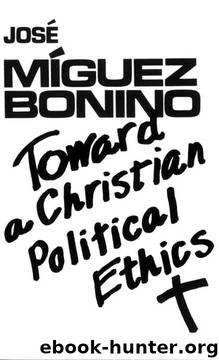Toward a Christian Political Ethics by Jose Miguez Bonino

Author:Jose Miguez Bonino [Jose Miguez Bonino]
Language: eng
Format: epub
THE THIRD COLONIAL PACT
The international economic and political conditions that paved the way for the emergence of populism did not last long enough to allow for its evolution into a new pattern for organizing society (this oft-made point is purely hypothetical anyway inasmuch as internal contradictions within the project might have rendered it nonviable in any case). At the end of World War 11 the international capitalist system, led by the U.S., was ready to regain and reshape its worldwide economic and political domination. The U.S. emerged from the war as the undisputed world power: it had sustained the fewest human losses, fought outside its own mainland territories, and kept its productive apparatus and economic-financial power intact while all the other countries (on both sides of the conflict) were being severely ravaged.
This emergence of the so-called Western world under the leadership of the U.S. lends credence to the thesis that in capitalist social formations the economic factor plays the predominant role. What takes place following World War 11 is, in effect, a major reaccommodation of capitalism, the chief feature of which is the integration of productive capital-and eventually also of financial and commercial capital-on an international scale. The transnational corporation (TNC) represents the culmination of that development. TNCs seek ever-increasing profits through an ever-expanding control of the international market. Oligopoly or monopoly control assures profits which satisfy the stockholders and guarantee success in the worldwide competition among TNCs. The degree of concentration achieved in this way is extraordinary and can easily be documented. The consequence is that the socalled capitalist laws of supply and demand become less and less significant; indeed, at the world level there is practically no free interplay of supply and demand because in this one integrated space that is the world economic order prices are not determined by supply and demand but by the power of the different agents-those states and coalitions of states and TNCs that operate in this "space."3
In such a situation it also becomes necessary to protect this "space" and to make it free for the operation of the TNCs. Thus, a whole system of military defense is organized and put in place in Europe, the Near East, the Far East, and Latin America. The doctrine developed to undergird and justify such a system has been articulated at the National War College (in Washington, D.C.), which was founded in 1948 for the preparation of the joint Chiefs of Staff but has included in its seminars hundreds of outstanding leaders from a variety of professions. We shall have occasion already in our next section to return to the contents of this doctrine. For the present it is sufficient simply to recall such facets of it as geopolitical control, total war, and power as the basis of national security. The so-called cold war was the background against which this ideology was first developed. It is this coalition of economic and military power that prompted President Dwight Eisenhower's warning about the "military-industrial complex" threatening to take-control..
How
Download
This site does not store any files on its server. We only index and link to content provided by other sites. Please contact the content providers to delete copyright contents if any and email us, we'll remove relevant links or contents immediately.
The Secret Power of Speaking God's Word by Joyce Meyer(3154)
Signature in the Cell: DNA and the Evidence for Intelligent Design by Stephen C. Meyer(3123)
Real Sex by Lauren F. Winner(3002)
The Holy Spirit by Billy Graham(2938)
The Gnostic Gospels by Pagels Elaine(2516)
Jesus by Paul Johnson(2349)
Devil, The by Almond Philip C(2323)
23:27 by H. L. Roberts(2245)
The Nativity by Geza Vermes(2221)
Chosen by God by R. C. Sproul(2157)
All Things New by John Eldredge(2149)
Angels of God: The Bible, the Church and the Heavenly Hosts by Mike Aquilina(1950)
The Return of the Gods by Erich von Daniken(1925)
Angels by Billy Graham(1917)
Knowing God by J.I. Packer(1848)
Jesus of Nazareth by Joseph Ratzinger(1801)
The Gnostic Gospel of St. Thomas by Tau Malachi(1780)
How To Be Born Again by Billy Graham(1775)
Evidence of the Afterlife by Jeffrey Long(1773)
